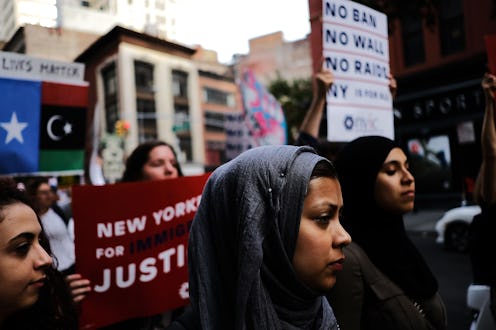News
The New Travel Ban Will Destroy What Makes America Great

On Monday, the Supreme Court announced it will hear the case challenging Donald Trump's executive order travel ban and temporarily reinstated parts of it, placing limits on travelers from six Muslim-majority countries. On Thursday, the State Department imposed a narrow definition of what family members will be allowed to enter under the ban — and it could have devastating effects on how immigrant families preserve their culture throughout the generations.
Under the State Department's guidelines, which were released on Thursday, the travel ban doesn't allow grandparents, grandchildren, aunts and uncles, or nieces and nephews of American citizens to enter the country from the nations in question. Step-siblings and step-parents, fiancés, and of course, parents, children and spouses are permitted.
For emigrating families working to maintain strong cultural roots, the separation from different generations can have devastating effects.
"I definitely disagree with this definition. Limiting the definition of family to exclude grandparents, in-laws, and other extended family for people that are from these six Muslim-majority countries — where family is everything, no matter how distant others may consider them, is unfair," says Roya Nadieri, the director of communications at Karam Foundation. "I think this ban is designed to ultimately destroy families from these countries."
The word Karam means generosity, or giving in Arabic, and it's fitting for the foundation. Since its launch in 2007, the Karam Foundation has been dedicated to building a future for Syria through education programs for Syrian refugee youth, emergency aid provisions, and investing in sustainable development project developed by Syrians. As of now, building efforts have expanded to Turkey, Lebanon, and Jordan, as well.
However, even with aid and support, the inability to stay in contact with family overseas creates a a splintering of cultural identity for refugee and immigrant families building lives in America, says Nadieri, whose family is Iranian-American.
"We would put money on cards to call our families overseas, and speak with our grandparents — to congratulate uncles and aunts and cousins. Our parents would work for months to get our grandparents visas, because them coming here was easier than us going there," Nadieri tells Bustle. "There were so many reasons to preserve the culture and language — practical reasons like being able to communicate with our families and navigate our motherlands. And now, this is just an added barrier, another reason for us not to keep these traditions and practices alive. But we will."
Nadieri tells Bustle that the travel ban's definition of close family extends far beyond the fracturing of individual families, and rather, would affect the wholeness of immigrant circles from the six targeted countries. Not only will it affect the safety and mobility of families, but largely, it will limit the cultural richness that communities glean from generations of tradition.
"When you leave home and start from zero in this country, you look for community — familiar scents, sounds — anything to remind you of where you came from," she says. "When you have kids that are enrolled in American schools, watching American films, it becomes increasingly difficult to keep your culture alive, but you look to your community to impact your kids."